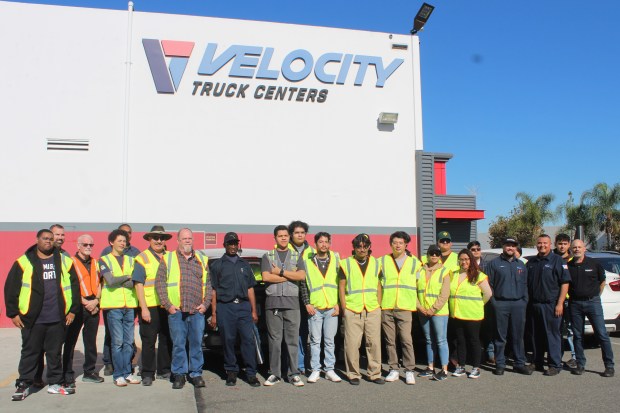Vanessa Salazar grew up tagging along when her father went to work as a truck driver.
Now 35, Salazar has started her career in the trucking industry and this year decided she also wanted to learn more about how to fix semi-trucks, especially electric-powered trucks that are now being introduced into the industry.
“I want to learn how to fix them as well, and all the electrical components is very interesting to me and I love it and it’s something I want to learn and understand more and one day be able to do it,” she said.
Salazar is one of many students who are part of Rio Hondo College’s automotive technology program. This week, students in the program got an opportunity to study an electric semi-truck and talk to its technicians at the Velocity Truck Centers Whittier Facility.
Starting Jan. 1, 2024, California’s Advanced Clean Fleet Rule goes into effect, requiring any semi-trucks being added to the drayage registry at ports to be zero-emission.
With an increasing number of fleets in California transitioning to battery-electric trucks, Velocity and other area dealerships are adding positions in maintenance and repair to ensure a smooth operation of electric trucks and charging infrastructure and have partnered with schools such as Rio Hondo.
The tour was organized as a workforce development opportunity as part of the Joint Electric Truck Scaling Initiative (JETSI) project – an initiative that will deploy 100 Class 8 battery-electric trucks across Southern California and demonstrate strategies to successfully scale market penetration of zero-emission technologies.
Through the JETSI project, Velocity provides maintenance to a fleet of 50 electric semi-trucks that trucking company Schneider National Inc. deployed into its intermodal operations, including in El Monte in June.
Students were greeted by Jason Shearer, vice president of service operations at Velocity, and Jeffery Hill, service manager at the Whittier Facility, as well as four technicians who currently work on battery-electric trucks.
“It’s a great career,” Shearer said. “There is so much opportunity within the dealer world, my dad was a diesel mechanic so I grew up working on things, but I had no idea the opportunity that came within trucking and the dealership side of things.”
As they walked around one of the EV trucks that Velocity technicians work on, the 22 students looked at the engine and other tools that are used to work on the trucks. Technicians talked about what they’ve learned and offered advice on what students need to know in order to get a job in the field. Shearer and Hill also shared some of the things that they look for when hiring for those positions at Velocity.
“That’s kind of the thing we look at when we’re hiring, completed schooling,” Hill told students. “We have an apprentice program, there’s a lot of checks that you tick off along the way but there is also a lot of on-the-job training with our technicians learning alongside.”
The apprenticeship program at Velocity started in 2020. It includes taking first-level technicians and putting them with team leads to work through basic shop skills, safety protocols, standard operating procedures and more, according to Shearer.
“We have partnerships with companies like this where they do internships and apprenticeships,” said John Frala, professor in advanced transportation technology and alternative fuels instructor at Rio Hondo College.
“We want to be able to get them into the community and serve their community,” Frala added.
Many Rio Hondo EV students on the tour are graduating soon, on Dec. 8, and are actively job seeking, officials hoped that the tour would serve as a potential job prospect at Velocity.
“My degree is in electric vehicles mostly, that’s why I’m very interested in this company, because they are converting to electric trucks,” said Eddie Ebdel, 31, who is in his last semester of the Rio Hondo program. “I think it’s the future, especially for California, because most of the trucking vehicles by 2035 are going to be electric and self-fuel, which includes hydrogen which will be a big deal in the future.”
Students said that they found the tour to be an eye-opening experience, especially to those barely starting the college program.
Salazar said she took away a lot of what was presented during the tour, especially about being passionate about the work.
“Yeah, hearing them talk about it and they said that they look at the passion that you have and I feel that way, if there’s no passion then why do it,” she said. “I personally love it and the pay is the last thing of my worries as long as I get to do it, it’s very interesting.”




